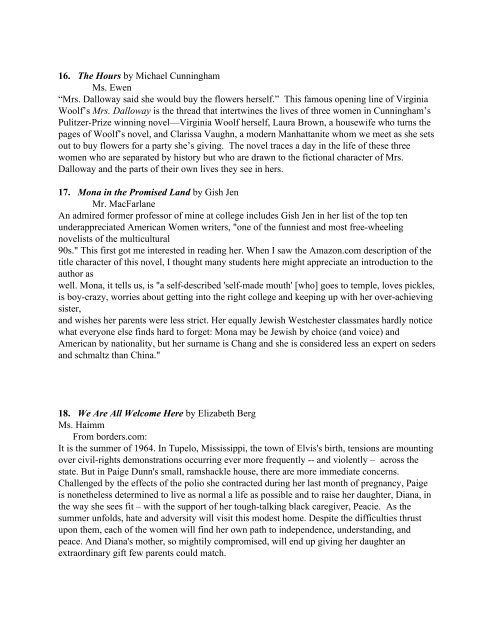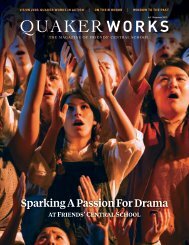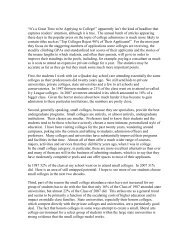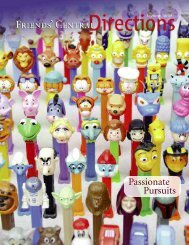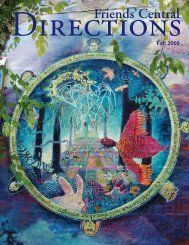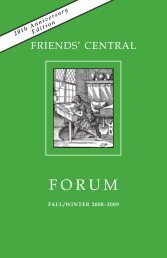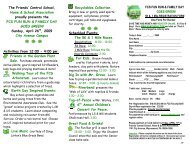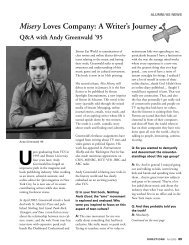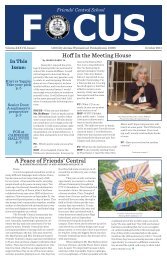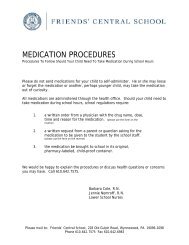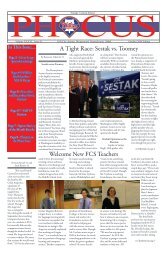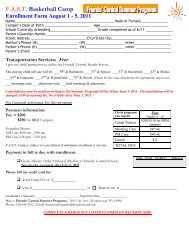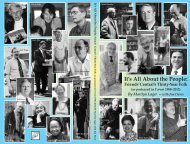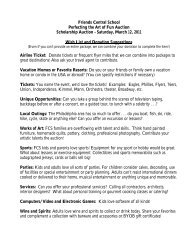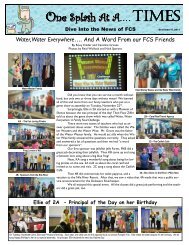10th_Summer Reading_2009 - Friends' Central School
10th_Summer Reading_2009 - Friends' Central School
10th_Summer Reading_2009 - Friends' Central School
Create successful ePaper yourself
Turn your PDF publications into a flip-book with our unique Google optimized e-Paper software.
16. The Hours by Michael Cunningham<br />
Ms. Ewen<br />
“Mrs. Dalloway said she would buy the flowers herself.” This famous opening line of Virginia<br />
Woolf’s Mrs. Dalloway is the thread that intertwines the lives of three women in Cunningham’s<br />
Pulitzer-Prize winning novel—Virginia Woolf herself, Laura Brown, a housewife who turns the<br />
pages of Woolf’s novel, and Clarissa Vaughn, a modern Manhattanite whom we meet as she sets<br />
out to buy flowers for a party she’s giving. The novel traces a day in the life of these three<br />
women who are separated by history but who are drawn to the fictional character of Mrs.<br />
Dalloway and the parts of their own lives they see in hers.<br />
17. Mona in the Promised Land by Gish Jen<br />
Mr. MacFarlane<br />
An admired former professor of mine at college includes Gish Jen in her list of the top ten<br />
underappreciated American Women writers, "one of the funniest and most free-wheeling<br />
novelists of the multicultural<br />
90s." This first got me interested in reading her. When I saw the Amazon.com description of the<br />
title character of this novel, I thought many students here might appreciate an introduction to the<br />
author as<br />
well. Mona, it tells us, is "a self-described 'self-made mouth' [who] goes to temple, loves pickles,<br />
is boy-crazy, worries about getting into the right college and keeping up with her over-achieving<br />
sister,<br />
and wishes her parents were less strict. Her equally Jewish Westchester classmates hardly notice<br />
what everyone else finds hard to forget: Mona may be Jewish by choice (and voice) and<br />
American by nationality, but her surname is Chang and she is considered less an expert on seders<br />
and schmaltz than China."<br />
18. We Are All Welcome Here by Elizabeth Berg<br />
Ms. Haimm<br />
From borders.com:<br />
It is the summer of 1964. In Tupelo, Mississippi, the town of Elvis's birth, tensions are mounting<br />
over civil-rights demonstrations occurring ever more frequently -- and violently – across the<br />
state. But in Paige Dunn's small, ramshackle house, there are more immediate concerns.<br />
Challenged by the effects of the polio she contracted during her last month of pregnancy, Paige<br />
is nonetheless determined to live as normal a life as possible and to raise her daughter, Diana, in<br />
the way she sees fit – with the support of her tough-talking black caregiver, Peacie. As the<br />
summer unfolds, hate and adversity will visit this modest home. Despite the difficulties thrust<br />
upon them, each of the women will find her own path to independence, understanding, and<br />
peace. And Diana's mother, so mightily compromised, will end up giving her daughter an<br />
extraordinary gift few parents could match.


